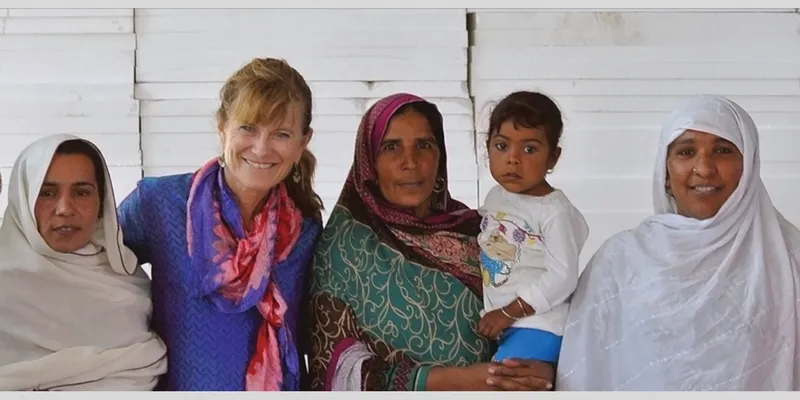From tackling poverty to helping disabled, Acumen India is bringing social change
Acumen India focuses on investing in social enterprises and has incubated over 100 entrepreneurs, startups and non-profits to date.
Over two billion people across the world lack access to basic facilities such as education, healthcare and safe drinking water, putting their health at risk, says a WHO report. The root of the problem is poverty.
With an intent to invest in companies and changemakers, rather than act as another philanthropic arm, Acumen, originally launched by Jacqueline Novogratz in 2001, was launched in India in 2006. It is a New York-based impact investor and a non-profit global venture fund.
“Acumen India focuses on investing in social enterprises and imparting leadership skills,” says Acumen India Country Director Mahesh Yagnaraman.

In the last 17 years, Acumen has invested over $110 million to build nearly 102 social enterprises in countries like Kenya, Ghana, Pakistan, India, Colombia, the US, and others. These enterprises have supported 60,000 jobs and have brought basic facilities like education, healthcare, clean water, energy, and sanitation to more than 200 million people.
“When we partner with companies or individuals, we look to closely align between the partner/donor and the programme to which the services will be applied,” he says.
The Acumen India Fellows Programme is a year-long leadership development programme that gives training to 20 individuals to accelerate their social impact and leadership potential. Since 2014, the Fellows community has grown to 92 changemakers, that consist of entrepreneurs, intrapreneurs, organization builders, activists, public sector officials, from all over the country, with one common minimum – the hunger to eradicate poverty.
The programme is structured like an executive MBA course in which the Fellows come together for five week-long seminars every year. Through this, they build strong networks within their cohort and Acumen’s global community. The applications for the next cohort are open until September 9.
YourStory takes a look at a few startups incubated by Acumen India.
1. Kheyti
Sathya Raghu, who gave up his job at PwC to start Kheyti in 2015, is on a mission to financially empower a million small farmers by 2025. Through Kheyti, he has devised a two-pronged solution to solve financial problems faced by farmers.

After reaching out to various financial institutions and banks, he signed an MoU (memorandum of understanding) with Bank of Baroda in 2017 to lend to farmers at 8.6 percent as opposed to the norm of 22 percent.
The Telangana-based organisation also introduced a greenhouse for farmers, one that occupies a mere two percent land share. Kheyti also introduced a low-cost modular greenhouse, integrated with end-to-end support to battle income variability. The organisation helps farmers gain access to loans and offers advice on better farming.
Kheyti has partnered with firms such as BigBasket, Northwestern Institute for Sustainability and Energy, T-Hub, AgriPlast, AIPICRISAT- Agribusiness and Innovation Platform, and Acumen Funderscircle to financially-empower the farmers.
2. RamRahim
Raghav Raghunathan, an Acumen India Fellow from the 2015 cohort, gave up job offers from Credit Suisse and Caterpillar to join RamRahim, a Madhya Pradesh-based watershed and livelihoods based grassroots organisation.
Promoted by the people, the driving force of RamRahim was the collective aspiration of 1,500 women from 162 self-help groups (SHGs) who wanted to ensure farmers had the right to sell their produce in the Mandi (marketplace) on their terms, and not what was dictated by moneylenders, traders, and middlemen. RamRahim was formed by SHGs as shareholders instead of individual farmers.

Inspired by their work, Raghav joined the team and spearheaded its operations in 85 villages. He introduced a fixed price mechanism for farmers, and also established a direct partnership with Safe Harvest (a social enterprise that markets pesticide-free farm produce) that helped market the produce. He managed to raise capital from Nabard Financial Services Ltd through a collateral free loan. RamRahim marked profits that year for the first time since it began operations in 2012.
3. Youth4Jobs
With the vision to create a better future for the youth with disabilities, Hyderabad-based Youth4Jobs was founded by Meera Shenoy in 2012. It assists and trains people living with developmental and intellectual restrictions. Its core philosophy is 'empowerment through disability’.
Youth4Jobs has set up job-linked skill development centres customised for different kinds of disabilities.
It provides training along with food and accommodation, and includes a specially-designed curriculum with modules on English, computers, soft skills and industry-specific skills, followed by on-the-job training. With fun-filled and interactive content, the youth are trained in sectors depending on their education and aspirations.

While their initial funding came in from the Axis Bank Foundation, the organisation is also supported by individual donors. It has also raised funds through a crowdfunding platform. Today, Youth4Jobs has 22 training centres in 12 states, with two coaching centres for the visually impaired. It has reached out to nearly 2,00,000 community members and over 500 companies.
4. Sukhibhava
Bengaluru-based Sukhibhava works with women in urban slums and educates them about menstrual hygiene and provides affordable menstrual hygiene products like sanitary pads through locally trained female micro-entrepreneurs.
Founded by Dilip Pattubala in 2013, Sukhibhava has reached out to over 7,200 women with affordable sanitary pads. It has educated over 11,800 women on menstrual hygiene till date, and is working with 18 female micro-entrepreneurs in south Bengaluru.
“Sukhibhava’s vision is my big dream - a day when every woman has access and awareness to hygienic menstrual practices. I want to work on similar issues that are often not talked about. Family planning will be our next project,” says Dilip, who is an Acumen Fellow from the 2016 cohort.
The organisation is self-funded and gets revenues by selling sanitary napkins. Dilip says with minuscule profits, it will take them a long time to become sustainable since they’re selling sanitary pads at a very low price. Sukhibhava’s impact has been recognised by UN Habitat’s India Youth Fund, Acumen Fellowship, Deshpande Foundation, Nasscom Foundation’s Social Innovation awards, Tata Social Enterprise Challenge and IIMB’s Unsung Heroes.
5. Project KHEL
With an aim to take education beyond the classroom, Akshai Abraham launched Project KHEL in 2012 in Lucknow. A non-profit initiative, the organisation uses sports and interactive play techniques to provide innovative, educational and leadership development opportunities to children from disadvantaged backgrounds. It looks to transform adolescents into informed and gender-sensitive citizens.
“Lack of basic life skills among underprivileged adolescents restrict their personal, social and cognitive growth. This negatively impacts them,” the team explains.

Project KHEL creates safe play spaces and provides holistic, interactive and experiential learning through story-telling, theater, dance, and games. Funded by UNICEF India, Letz Change, and LetzDream Foundation, the startup facilitates thematic workshops on crucial issues like child sexual abuse, menstrual hygiene management, and puberty.
6. Help Us Green
Founded by Ankit Agarwal and Karan Rastogi in 2015, Help Us Green is a social enterprise with a mission to save river Ganges.
Ankit says, "About a billion people in India offer flowers at temples, mosques, and gurudwaras every day. These flowers are later discarded in the rivers. But no one thinks of the aftermath."
"These flowers rot and kill fishes and other creatures in the water. The pesticides and chemical fertilisers used to grow flowers mixes with the river water making it highly toxic (pH 4.7). Every year, about 800,000 tonnes of flower waste is dumped in Indian rivers choking the acquatic life to death."

Hence the duo found an innovative solution to process the refuse and convert it to compost with the help of earthworms, an alternative to chemical fertilisers, with zero carbon footprint. They named this compost as ‘Mitti’.
Funded by Tata Trusts' Social Alpha, Greenfield Ventures, and Echoing Green, the Kanpur-based startup has a revenue of Rs 2 crore. Presently, the duo has three plants based in Varanasi and Mathura and the company processes over 38 tonnes of flowers a day.







